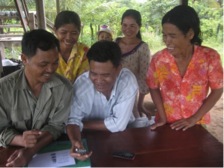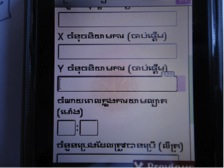Guest post by Amanda Bradley, Director of Pact’s Community Forestry Partnership Program in Cambodia

The Oddar Meanchey Community Forestry REDD project is the first of its kind in Cambodia. This project was initiated in 2008 when international consensus crystallized around a mechanism called REDD (Reduced Emissions from Deforestation and Degradation), aiming to compensate developing countries that could successfully protect their existing forests. Since the loss of forests equates with approximately 20 percent of global carbon dioxide emissions, protecting existing forests is seen as a significant part of the solution to global warming.
The key idea behind the Oddar Meanchey project is that if the thirteen participating communities can stop the deforestation in the 64,000 hectares of forest that they have been given rights to manage, then they will earn money through the voluntary carbon market. Over the course of the 30-year project, these credit payments will be used not only to strengthen forest protection efforts, but also to boost the local living standards of 10,000 participating households.
One of the most challenging aspects of the REDD project development is the design and activation of the project monitoring system. In order to comply with international standards, it is necessary to provide comprehensive data to prove that the project actions have resulted in reduced deforestation. In general, communities conduct patrols several times a week to monitor and prevent illegal logging, hunting, and encroachment. In order to streamline the process of data collection, Pact decided to trial FrontlineSMS’ data collection tool, FrontlineForms, with several community leaders to see if the system could be used to efficiently collect field data during forest patrols.
Pact’s first step was to design a simple Khmer language form that could be sent to community leaders to complete during patrols. We purchased several mobile phone handsets compatible with the system and Khmer language requirement (we used the Nokia 5130). Next, Pact’s team trained local leaders how to complete and submit a form. All of the community leaders had never used SMS (text messaging) before, so it took some time for them to get used to the idea of communicating this way, even though the text was in Khmer. However, as the trial progressed they were able to use FrontlineForms to send in information related to their forest patrols; including date, time and length of the patrol, number of patrollers, GPS waypoint for the starting point, fuel used, and presence or absence of illegal activity, wildlife sightings, and fire.
Overall, the trial was a success because it greatly reduced the time and effort to collect field data. Community leaders logged a total of 28 patrols. They said that they were happy to use the system, and appreciated the automatic response confirming receipt of their data. They also provided useful tips for further improvement of the system. For instance, they said that the Form needed to be adjusted to accommodate data for overnight patrols. They also learned that if patrolling in remote locations without telephone reception, they needed to wait until returning to the village before sending their Forms.
As a result of using FrontlineSMS, Pact was able to collect valuable data on the forest patrols which normally might take many days to compile. There is no longer a need for collecting and translating handwritten paper forms from all corners of the province. There are still some challenges - such as certifying data accuracy and avoiding double submission of the same Form - but as community leaders gain experience with the system, the submissions are likely to improve. Pact is now expanding our use of FrontlineForms to cover all of the communities in the project area. Pact will also gradually expand the number of Forms and variables handled by the system as communities become more familiar and comfortable with using FrontlineForms. Eventually, Pact aims to install an automatic alert for urgent issues such as illegal logging or fire to speed up response time from local authorities.
Use of FrontlineForms has the potential to save significant time and effort in data collection for REDD project implementation and reporting. And the more resources that are saved this way, the more credit payments available to support forest protection activities and community livelihoods.
For more information on Pact’s Community Forestry Partnership Program in Cambodia visit: http://www.pactcambodia.org/Programs/Program_CFP.htm.
You can also check out this in-depth report from Pact about their use of FrontlineSMS, and the lessons they've learned so far.
If you would like to connect with Amanda and others using FrontlineSMS in Cambodia then you can go along to a user meet-up in Phnom Penh due on 23rd April. For more information on this visit our community forum. There is a Meet-Ups and Regional Networks group on our forum to help enable FrontlineSMS users to connect with each other, and share lessons learned. So if you're a FrontlineSMS user why not join our forum and start sharing today!


